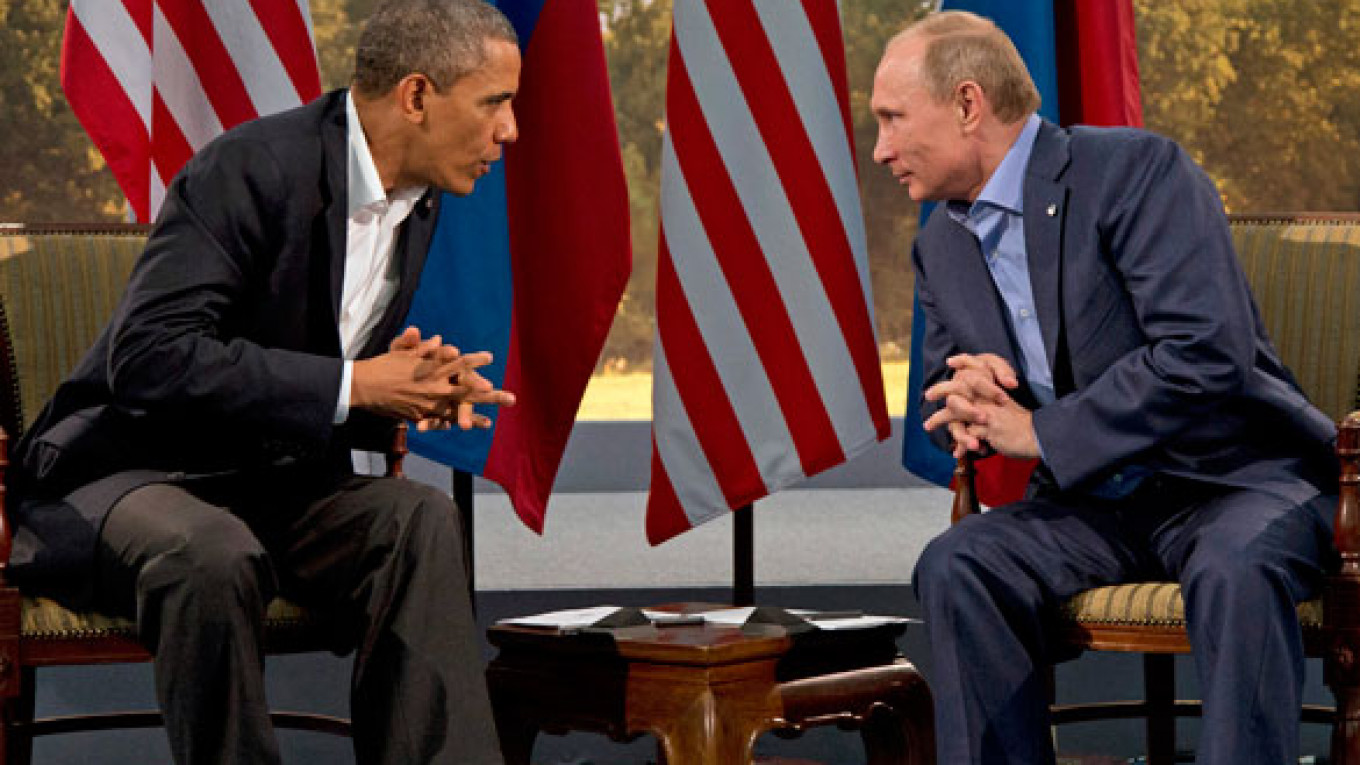Placing new pressure on the Kremlin in the case of National Security Agency leaker Edward Snowden, the White House said it was considering canceling a summit between Presidents Barack Obama and Vladimir Putin in Moscow, and two U.S. senators urged Obama to consider recommending a new site for a separate Group of 20 summit in St. Petersburg.
The White House is dangling that summit cancellation option over the Russians as Moscow considers a temporary asylum petition from Snowden, the American accused of leaking information about classified U.S. intelligence programs.
The White House indicates that it might cancel a summit between Obama and Putin in Moscow in September.
But officials have privately signaled that scrapping the bilateral talks would also be retaliation for other areas of disagreement with Russia, including its continued support for Syrian President Bashar Assad's attacks against civilians.
Regardless of what happens with Snowden, the White House says Obama will still attend the G20 summit in St. Petersburg. But officials have gone out of their way in recent days to avoid publicly committing to the meetings in Moscow.
"The president intends to travel to Russia for the G20 summit," White House spokesman Jay Carney said late last week. "And I have no further announcements to make beyond what we've said in the past about the president's travel to Russia in the fall."
By simply considering cancellation of the trip, the Obama administration is indicating its concern that the Kremlin will allow Snowden to take refuge in Russia. The White House has called on Russia to return the 30-year-old former government contractor to the U.S., where he is facing espionage charges.
Snowden, in a temporary asylum request submitted by his lawyer Tuesday, claimed that he faced persecution from the U.S. government and could face torture or death.
Andrew Kuchins, director of the Russia program at the Center for Strategic and International Studies, said the White House's cancellation threat could be effective leverage over Putin, who likely wants to avoid an embarrassment on the world stage.
"When the spotlight of the world is on him and Russia, he doesn't want that spotlight to reveal a lot of negative things which are going to be distractions," Kuchins said.
Canceling the U.S.-Russia talks would deepen the tensions between the two leaders. And it would likely make it even more difficult for the two countries to find common ground on areas of disagreement that plague the relationship.
The U.S. accuses Russia of providing military support to Assad that has allowed him to cling to power during more than two years of clashes with rebels seeking to overthrow his government. The U.S. deeply angered Russia earlier this year when it announced sanctions against 18 Russians as part of a law named after Sergei Magnitsky, a Russian lawyer who was arrested in 2008 for tax evasion after accusing Russian police officials of stealing $230 million in tax rebates. Within days of the Treasury Department announcement, Russia announced that it was banning U.S. adoptions of Russian children.? ? ? ? ? ? ? ? ? ? ? ?
Putin's spokesman, Dmitry Peskov, said Friday that the U.S. had not informed Russia of any plan by Obama to pull out of the summit with Putin in Moscow in September.
Meanwhile, two U.S. senators urged Obama on Friday to consider recommending a new site for the G20 summit if Moscow continues to allow Snowden to remain in Russia.
Senators Chuck Schumer, a Democrat, and Lindsey Graham, a Republican, introduced a resolution that said the president "should consider options, including recommending a different location for the September 2013 G20 summit in St. Petersburg, Russia, should the Russian Federation continue to allow shelter for Mr. Snowden."
"On multiple fronts, Russia is becoming one of the bad actors in the world," Graham said in a statement. "Russia continues to provide cover to the Iranian nuclear program and sell sophisticated weapons to the Assad regime in Syria to butcher tens of thousands of its own citizens. For Russia to grant temporary asylum to Mr. Snowden on top of all this would do serious damage to our relationship."
Earlier in the week, Graham suggested that the U.S. consider a boycott of the 2014 Winter Olympics in Sochi in February if Russia grants asylum to Snowden.
Meanwhile, Sports Minister Vitaly Mutko said Friday that it would be "stupid" to let Moscow's refusal to extradite Snowden interfere with the Sochi Games.
Sports should be separate from politics, Vitaly Mutko said, warning against a repeat of the boycott of the 1980 Summer Olympics in Moscow by the U.S. — a protest against the Soviet invasion of Afghanistan.
Also Friday, Putin's spokesman Peskov said he was unaware of any plans by Snowden to seek Russian citizenship.
"Citizenship? This is the first I've heard of it. It's news to me," Peskov told reporters in the town of Novogorsk outside Moscow where Putin was meeting athletes.
Material from The Associated Press and Reuters was used in this report.
A Message from The Moscow Times:
Dear readers,
We are facing unprecedented challenges. Russia's Prosecutor General's Office has designated The Moscow Times as an "undesirable" organization, criminalizing our work and putting our staff at risk of prosecution. This follows our earlier unjust labeling as a "foreign agent."
These actions are direct attempts to silence independent journalism in Russia. The authorities claim our work "discredits the decisions of the Russian leadership." We see things differently: we strive to provide accurate, unbiased reporting on Russia.
We, the journalists of The Moscow Times, refuse to be silenced. But to continue our work, we need your help.
Your support, no matter how small, makes a world of difference. If you can, please support us monthly starting from just $2. It's quick to set up, and every contribution makes a significant impact.
By supporting The Moscow Times, you're defending open, independent journalism in the face of repression. Thank you for standing with us.
Remind me later.


